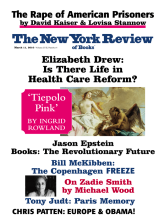In response to:
Ted from the November 19, 2009 issue
To the Editors:
Senator Edward M. Kennedy is beyond our reach now, so being critical of his widely praised posthumous memoir can be fraught. His book True Compass has been described as “graceful…candid…definitive” and filled with “searching candor.” In his review of True Compass [NYR, November 19, 2009], Russell Baker discusses Kennedy’s account of an interview that I conducted with him in 1979, when I was working at CBS. Baker writes that thirty years later, Kennedy was still upset that I had asked him why he wanted to be president, even though it was widely believed among politicians and journalists alike that the only thing missing from his candidacy was a formal announcement.
But for my part, Kennedy’s account of our 1979 CBS interview is a complete fabrication and I am at a loss to know why thirty years after the fact he would embrace such a fantasy, other than to try to explain away a politically embarrassing incident.
This is his account, drawing from his book:
I’d granted the interview to Mudd as a personal favor, during a critical moment in his CBS News career…. Roger approached me and said…”I’m in this contest with Dan Rather for the anchor position at CBS News, and I’d love to get an interview with your mother.” (It was common knowledge that Mudd had been expected to replace Walter Cronkite when he hit the age of mandatory retirement at CBS, but Rather was giving him a serious run for his money.)…
A day or two before the scheduled interview, my mother fell ill and left the Cape for Boston…. I telephoned Roger, explained the situation, and tried to put off the interview. “Oh, no,” he replied. “That’ll be all right. I’ll come on down. We’ll do you and the sea and Cape Cod, and what the sea has meant.”…
As we took our chairs out in front of the house, the camera rolled, and we talked for some forty minutes about the sea and the Cape. During a break, I looked at the time, and said, “That’s about it, isn’t it?”…”No,” he said. “We’d really like to do just one more.”…
The cameraman put in a fresh roll of film and Roger resumed his questions. The first had to do with Chappaquiddick. Then he asked about my marriage. My discomfort and unhappiness with the line of questioning was more than apparent on my face and in my halting answers…. I telephoned Mudd the next day and said, “Look, if we’re going to do this thing, I want another crack at it.” Mudd agreed. Our understanding called for two sessions anyway; and so on October 12 we sat down again, this time in my Senate office in Washington. The cameraman signaled that the film was rolling, and Roger Mudd asked:
“Why do you want to be president?”
These are the facts: In late spring 1979, Howard Stringer and Andrew Lack, producers for CBS Reports, and I met with Kennedy and his press secretary, Tom Southwick, to propose a one-hour documentary on the senator. We asked for two separate interviews with him—one on Cape Cod on family and personal matters and one at his Senate office about senatorial and political matters. An interview with his mother or even her appearance was never mentioned. As further proof that our program was to be about him and not his mother, he gave us his approval for our camera crew to shadow him for filming what is known as B-roll footage. He was agreeable to all of our requests. We made no requests to film B-roll footage of his mother.
During that spring and summer, the program’s producer, Andy Lack, and a CBS film crew accumulated footage of the senator in his office on the Hill, in Massachusetts, with his children and uncounted cousins and nephews on their annual camping trip. Rose Kennedy was seen briefly to tell the children goodbye. She did not appear to be ill.
On September 28, 1979, I flew up to Boston and the next morning producer Lack, executive producer Howard Stringer, two film crews, and I drove down to the Cape for the Kennedy interview at his home on Squaw Island. If Rose Kennedy had fallen ill, none of us knew anything about it. Never had there been any discussion of using Kennedy as a replacement for his mother or confining my questions to what the sea and the Cape have meant to the Kennedys. Nowhere in the transcript of our interview is there a mention or a question about the relationship between and among the sea, the Cape, and the Kennedys. In fact, my very first question was about Camelot.
The first part of the interview covered everything from Camelot, Jimmy Carter’s record, his own presidential candidacy, the media, family privacy, his marriage, and his personal safety. At this point, everybody took a break so that the crews could reload their cameras with fresh film.
The second part of the Squaw Island interview dealt exclusively with Chappaquiddick, his behavior, and its consequences.
Two weeks later in Kennedy’s Senate office in Washington, I did the second of the two interviews we had agreed to. I began by tying up some loose ends about Chappaquiddick and then shifted subjects to ask him why he wanted to be president.
I remain mystified, perplexed, angered, and saddened that the senator would have endorsed such a false account in what amounted to his last testament.
Roger Mudd
McLean,Virginia
This Issue
March 11, 2010



